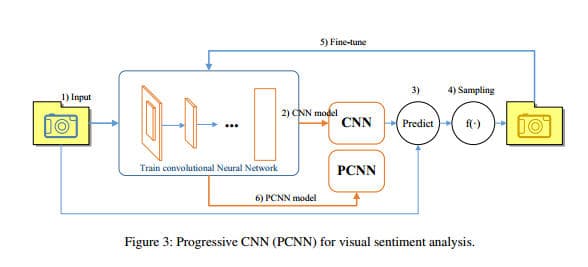What could possibly be a leap in AI technology is a novel method devised by scientists at Adobe Research and the University of Rochester to train computers to draw insights on ‘Visual Sentiments’ from mere images.
A paper, entitled “Robust Image Sentiment Analysis Using Progressively Trained and Domain Transferred Deep Networks,” was presented at the American Association for Artificial Intelligence (AAAI) conference in Austin, U.S. It explains how in the recent past Convolutional Neural Networks (CNN – a supervised learning algorithm, where parameters of different layers are learned through back-propagation) have been very successful in image classification tasks.
“We propose to develop a suitable convolutional neural network architecture for visual sentiment analysis. Moreover, we employ a progressive training strategy that leverages the training results of convolutional neural network to further filter out (noisy) training data,” the researchers write.
PCNN- via the research paper.
Working with 90% images from a half million Flickr images as the training dataset. where the remaining 10% images constitute the testing dataset, the researchers trained something called a Progressive Convolutional Neural Network with 300,000 iterations of mini-batches (each mini-batch contains 256 images).
“Positive (top block) and Negative (bottom block) examples. Each column shows the negative example images for each algorithm (PCNN, CNN, Sentribute, Sentibank, GCH, LCH, GCH+BoW, LCH+BoW). The images are ranked by the prediction score from top to bottom in a decreasing order”- via the research paper.
An image dataset developed from image tweets with a total of 1269 images acted as the testing images.
“However, visual sentiment analysis is quite challenging because sentiments or opinions correspond to high level abstractions from a given image. This type of high level abstraction may require viewer’s knowledge beyond the image content itself,” the paper points out. “In addition, people may have totally different sentiments over the same image.”
The paper was authored by Quanzeng You and Jiebo Luo from the University of Rochester and Hailin Jin and Jianchao Yang from Adobe research.
On large scale online user generated content, sentiment analysis will provide more robust signals and information for many data analytics tasks, believe the researchers. Utilization in social media for prediction and forecasting, measuring economic indicators or election outcomes is imminent.







